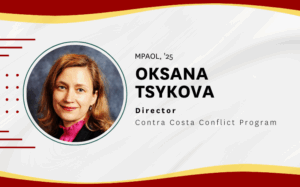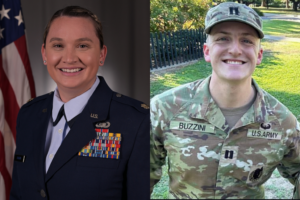Tiffany Chum knew she was passionate about public service—but the path forward wasn’t always clear. After working in the private sector for over a decade, she enrolled in the USC Price Master of Public Administration Online (MPAOL) program to explore her leadership potential and grow her impact. Now, she reflects on how the program helped her build confidence and sharpen her skills so that she could tackle some of Los Angeles’ biggest challenges.
Q: What factors motivated you to further your education?
A: A life goal of mine has always been to get my master’s, but I am just one of those people who never knew what I wanted to do. So I did a lot of research. At the time I had been in the private sector for over a decade, and was really looking into my philosophy about life. I realized that my career, though fulfilling in many ways, wasn’t fulfilling in the way that I wanted to make an impact on my community and give back.
When I looked at the curriculum and courses offered by the USC Price online program, I thought, this is really interesting. All the classes sounded fantastic. I also really like the model in terms of having the [in-person] residency, as well as the chance to pick your own adventure in regards to what certificate you wanted to get.
Q: Why did you choose the USC Price online MPA program?
A: For me, [the curriculum] really stood out as well as the on-site residencies. The program seemed really doable with my life and full time career. A lot of the core tenets I was hoping for to further my education were there.
In regards to the different topics that were covered, I feel like some of the other online programs had courses that sounded interesting, but weren’t really tailored to what I was hoping to learn more about. For example, I love urban planning and philanthropy, and those happen to be two courses that were offered at the program. Other public administration programs seemed a little more dry in terms of what might pique my interest.
Also, this is a fully online, immersive course. But you’re going to meet the people [during residencies] before you start these classes, and at the end of it. You’re going to probably have a capstone with them, and get to know them, and wrap up your education with them as well. So that was really enticing for me.
Q: Was there a specific course or professor that had an impact on you?
A: The strategic planning course really stood out. We had a project where we worked with a real organization and built out a full strategic plan. That was such a good learning experience because it was real, and we had to think through everything from vision to implementation.
Also, Organizational Behavior made me think more intentionally about the kind of leader I want to be. It wasn’t just about managing systems—it was about understanding your own leadership style, your strengths, and how you work with people. That kind of reflection was really powerful.
Q: What does the USC alumni network mean to you?
A: I have a USC keychain and someone saw it when I was abroad, and they wanted to talk to me about what I do with my life. And you know, it’s just one of those things that seems kind of surreal. Being a part of the Trojan Family, I can attest [to the strength of the network] during my tenure at USC and afterwards. It’s really amazing how this network of folks is like, “Oh, we just have this one thing in common,” but that’s able to facilitate opening so many different types of doors.
Yes, the curriculum was fantastic. The courses were fantastic, but just knowing that the USC name has such a history with so many different types of people around the world [was really important]. That reputation is there.
Q: What were your outcome goals when you started the program?
A: I was hoping that it would help me reevaluate what I wanted to do in the long term in my career. And even just after the first course, I think I realized quickly, “Oh, this is where I want to be. This is the type of work I want. Working with the public and focusing on these big ‘unsolvable problems’ that seem so daunting. And the end goal is not to make money, right? The end goal is actually to make life better and to make our society better. I think that actually ended up being a big goal of mine. I think the program really helped facilitate the different possibilities and pathways.
Q: Why did you choose an online program based in Los Angeles?
A: It was important for me to stay in L.A. because my career so far has been here. My family is here. It was during Covid-19 and I know some folks made the decision to move abroad or across the country. But for me it was really not an option, I needed to stay put and really figure out what I wanted to do in the next steps of my career, especially if I was going to pursue my education. So staying in L.A. was absolutely a priority.
Q: What was your experience with the online modality?
A: So before this program, I actually had not taken any online courses or online classes. What I really was impressed with was that [the Online MPA] has been doing this for years, versus a lot of programs that [started doing it in] 2020.
Q: How did your experience at the on campus residencies help you meet your goal of tackling “unsolvable” social problems?
What I really appreciate about the on campus residencies is that you meet people in the flesh. It wasn’t just a box on Zoom. You know you got to meet this whole person, [learn] what their interests were, talk about why they were there and what they were hoping to do with [the degree]. I think it really facilitated the idea that we’re all in this together. We’re trying to collaborate to not just pursue our own education, but also because these might be the future people I work with.
I really appreciate that when we had those opportunities to meet in person it wasn’t just all talk about school, it was also talk about personal and professional goals. I think I made such good connections that I wouldn’t be surprised if people reached out to me now and said, “Hey, I know you’re at the Mayor’s Office. This is a really cool project. I’m working at my nonprofit. What do you think about partnering up for that?”
That really is what I feel is the core of the online MPA program. It was about creating these relationships and networks that really help facilitate the bigger overall problem solving machine. That was such a selling point for me when I saw that it wasn’t just purely online. I’m really grateful that the program had that.
Q: How did you balance the demands of school with your professional and personal life?
When you’re going to add that additional educational piece, you really do need to be able to block off time. So that’s what I did. I would look in advance [and schedule]. It’s really a proactive type of program. You can’t just sit back and hope that it gets done. For anyone who is thinking about whether this is right for you, I think you know yourself the best. It’ll feel impossible, maybe the first couple of weeks, but it’s not impossible, and many people have come before who’ve been successful. I think just be honest about what the program is going to demand of you.
I know that before going into the program I had heard that people didn’t take online programs very seriously. But this is not one of those programs that you just log in and log out. You’re going to have to put your best effort and best foot forward if you want to succeed, and that is kind of the expectation that’s instilled in you from the very first class. So again, you just have to be honest with what you’re willing to put in, because that is what you’re going to get out of it.
Q: What was your interaction with your professors?
A: One of my favorite pieces about this program was that the professors were so accessible. They were always willing to pick up the phone and call me if I emailed them for help. I am naturally extroverted, so I chat with everyone. I took advantage of just building those relationships with professors, so that even when I go back to an alumni reception, they remember me.
I appreciate that I had some professors who were a little bit more analytical and some who were a little bit more grounded in government work. Building relationships with professors is such a big part of the online MPA program because they are a wealth of knowledge, and they will definitely help guide you if you have questions about your career.
Q: What was your interaction with your classmates?
A: I was really excited to meet people that I don’t think I would have crossed paths with in my previous life. These are folks who have been in the nonprofit industry, on the ground in local government, county government, even the federal level.
I was able to learn so much from so many different types of people and I think it just helped broaden my expectation of what people’s desires are to help the community and what their backgrounds may be. I appreciated learning more about my fellow Angelenos as well as folks who weren’t from California, and what their lived experiences were, and why they want to make this place better.

Master of Public Administration Online
Advance Vital Institutions
Advance your career and the institutions you serve with our exceptional MPA online.
Find Out MoreQ: How do you think the projects in the online MPA program helped prepare you for the future?
A: In all of the projects we were provided with different perspectives. It always made us step out of what our typical response would be and realize a number of things. One, you’re going to have to collaborate with people, and that is going to be the core of any job you get in government or even in the private sector.
And two, even if the data is there, and the answer seems really straightforward, you still have a lot of obstacles to go through in terms of what people’s motivations are. I think it was really helpful to understand that we all have different perspectives and motivations. Even looking at the same data, we’re all going to come to different conclusions about what that data means, and that might also, you know, alter what we think the possible solution is.
Q: Is there something you learned in the program that was most impactful in your career? If so, how did you apply it?
A: Thinking back about my experience in the online MPA program and what was most impactful to my personal career growth was the idea that we are all trying to work towards a better future and trying to work towards a solution. We may have different ways of getting there and we may have opposing perspectives, but I think the biggest thing I realized was that there’s not just one right answer. I mean, there can definitely be wrong answers. But there’s not one right answer that is only going to come from me. It’s going to take the collaboration of many, many people before you and after you.
Q: Would you recommend the online MPA program to a prospective student? What advice would you give them?
I would definitely recommend the MPA Online program at USC Price to anyone who’s looking to get into the public sector or just to learn more about public administration. The program itself was able to provide such a variety of courses as well as the ability to interact with people from all walks of life with different priorities, but all who really had similar goals in the end to give back to the community and to be a public servant.
I think that the advice I would give for anyone coming into the program is to make sure you’re honest about the type of work that you’re willing to put in. Yes, it’s online, but it is not easy. It definitely is very rigorous. There’s going to be a high bar and high standards for you to uphold. And it’s on you. What’s really lovely about the program is there’s so many resources, your professors, your coaches, other students, that you can lean on. So at the end of the day you need to just be accountable for yourself and the actions you need to take. It’s your education. Just make sure that you know yourself and how to prioritize and organize your time. You absolutely can do it.



